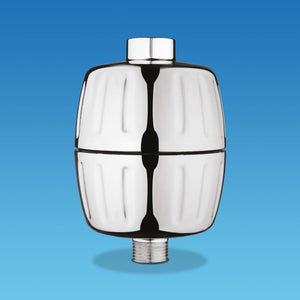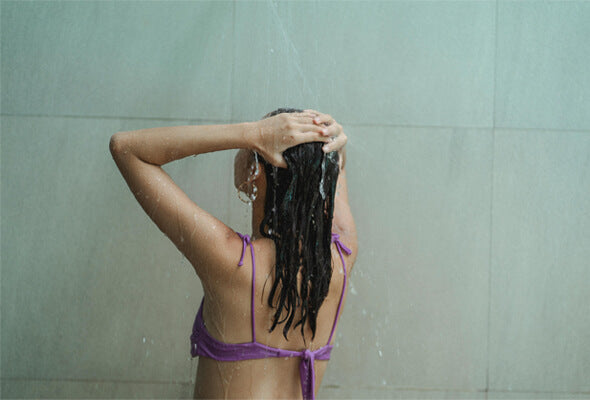One of the most common concerns when swimming is the impact of chlorinated water on hair. Does chlorine damage hair? The simple answer is yes. Chlorine can harm hair, leading to brittleness, dryness, and other issues. Let’s explore this more below and learn how you can protect your hair:
Why is Chlorine Bad for Your Hair?
Chlorine is a strong chemical used to disinfect pools and household water supplies. While it does help to keep water clean, it can damage hair. Chlorine binds to the natural oils and proteins in hair, stripping it of moisture and damaging the structure.
This chemical reaction can damage hair, especially if you swim or shower often. Because chlorine has dehydrating properties, it can be hard on hair as it messes with the outer layer known as the cuticle.
Once the natural shields are gone, hair can break more easily, become frizzy, and cause other issues. So, is chlorine bad for your hair in every case? The answer depends on how often your hair comes in contact with it and whether you take steps to protect it.
How does Chlorine Affect Hair?

When hair has come in contact with chlorinated water, it can be damaged by:
- Moisture loss is caused by chlorine removing natural oils, leading to dryness.
- Protein damage to the keratin protein, which makes it weak.
- Chlorine leaves residues that can build up over time and lead to further damage.
- If your hair is dyed, chlorine can strip or change the pigments, leading to a change in color or fading color.
So, is chlorine bad for your hair when it comes to long-term effects? Absolutely—because repeated exposure weakens the cuticle layer, leaving your hair more vulnerable to breakage, frizz, and dullness over time.
Signs of Chlorine Damage Hair
Chlorine exposure will not go unnoticed, especially if you are going swimming or showering often. Here are some of the clear signs that your hair may be damaged from chlorine:
1. Dryness and Brittleness
One of the clear signs of chlorine damage is dryness. Chlorine strips away the natural oils that keep your hair smooth and soft, making it prone to breakage and brittleness. This dryness can make styling more difficult and cause split ends.
2. Color Fading
If you have dyed or highlighted hair, chlorine can be damaging and problematic. The chemical interferes with dyed hair and can change color or fade over time. Blonde hair maybe even more at risk, and it can commonly take on a green tint due to chlorine’s reaction with copper in a pool or shower water.
3. Loss of Shine
Healthy hair is naturally shiny, a sign that it is well cared for. However, chlorine can remove the shine, leaving hair dull and lifeless.
4. Texture Changes
Chlorine can change the texture of your hair, making it feel rough and coarse. This happens because the cuticle layer is disrupted, making your hair less smooth to the touch and uneven.
5. Tangled and Knotted Hair

Chlorine might cause more friction between your hair strands, leading to tangling and knots. Long hair is especially prone to this happening after exposure to chlorine in your water supply or pool.
6. Scalp Irritation
Chlorine does more than damage hair; it can also irritate the scalp, itching, redness, and flakiness. Over time, this can lead to hair thinning and discomfort.
7. Increased Frizz
Frizz and flyaways are extremely common after exposing hair to chlorine because chlorine removes moisture and disrupts the cuticle. Chlorine also leaves hair vulnerable to humidity, making it much more difficult to manage frizz.
Managing frizzy hair can be difficult, as it results from damage to the hair cuticle, leaving you with an unruly appearance. To reduce frizz, you must focus on hydration with deep-conditioning treatments, use anti-frizz serums, avoid chlorine and other harsh chemicals, and use heavy heat.
How Can You Prevent Chlorine Damage?
It is much easier to prevent chlorine damage than to repair damaged hair afterward. A few simple precautions can help to keep hair nice and healthy.
Pre-Swim Protection
Adding a leave-in conditioner or oil before swimming or showering is a good idea. These products will form a barrier between the chlorinated water and your hair, minimizing the absorption.
Wear a Swim Cap
A swim cap is a fantastic way to shield hair from direct contact with chlorinated water in a pool. While it may not keep hair bone dry, it will significantly lower exposure.
Rinse Hair Immediately
There is a reason that you find showers at pools, and one great reason is that they enable you to rinse your body and hair with water as soon as you leave the pool.
Ensure you rinse it thoroughly, as this helps to remove the chlorine before it can bind to your hair. The water provided could also contain chlorine, so you may still need to use an anti-chlorine shampoo.
Apply a Protective Product
If you swim or shower often, consider using specialized products designed to reduce chlorine from hair. For example, you can use anti-chlorine shampoos or sprays. These will help neutralize chlorine's effects and protect your hair.
Limit Exposure
Suppose you can try to limit the frequency or length of time swimming or showering in chlorinated water. On the days when you cannot avoid contact with chlorinated water, make it a priority to take steps to protect your hair and prevent negative effects.
How Can a Showerhead Filter Help Reduce Chlorine?

Chlorine isn't just a concern when it comes to pool water. It can also be present in tap water; using a shower head filter can effectively reduce chlorine levels and provide soft, gentler water for your hair.
These filters use activated carbon and other materials to neutralize chlorine before it can touch your hair and scalp. Including a shower head filter in your daily routine can help reduce any exposure to chlorine, improving your skin, hair, and fingernail health.
Treatment for Chlorine-Damaged Hair
If your hair is already damaged from chlorine, there are some steps that you can take to restore its health.
At-Home Remedies
If you have mild to moderate damage, then home treatments can work wonders in helping your chlorine-damaged hair:
- Deep Conditioning Masks: Using deep conditioning masks on a regular basis can help restore lost moisture and knowledge to the hair. Look for masks that are rich in aggregates such as argan oil, keratin, or shea butter so that you can replenish the hydration and also strengthen your hair. Ideally, you should apply them once or twice a week for the best results.
- Apple Cider Vinegar Rinses: Apple cider vinegar helps to balance the pH levels of your hair. It removes chlorine residue and seals the cuticle for added shine. Try diluting one part apple cider vinegar with two parts water and using it as a final rinse after you have shampooed to help detoxify your hair and scalp.
- Coconut Oil Treatments: Coconut oil is a natural element that penetrates deep into your hair. It helps to repair damage from within. Try warming the oil slightly and then applying it to your hair, leaving it for around 30 minutes or overnight for a better result. This helps to restore the elasticity and softness of your natural hair.
- Aloe Vera: Aloe vera is soothing and hydrating, which makes it great for chlorine-damaged hair. Apply pure aloe vera gel to your hair, leave it for around 20 minutes, and then give it a good rinse. This will help to calm any scalp irritation and also add moisture to any dry ends.
Professional Treatments
There are many professional treatments that you can use for severe chloride damage professional treatments such as:
- Keratin Therapy: Keratin therapy is designed to replenish lost proteins and help remove the hair cuticle. It also helps to prepare damages and restores shine and manageability, making it perfect for chlorine-weakened hair.
- Deep Hydration Sessions: salons often offer hydration treatments that use specialized products or steam to infuse moisture into the hair deeply. These are great for combating extreme dryness and brittleness that is caused by chlorine.
- Scalp Treatments: If your chlorine exposure has irritated your scalp, consider using a professional scalp treatment. These treatments balance pH levels, promote healthy hair growth, and reduce inflammation.
- Hair Trims: If chlorine has caused significant damage to your hair, you may experience extensive split ends and breakage. In such cases, a trim may be necessary to remove the damaged portions. While it may seem counterproductive to cut off the damaged ends, especially if you swim or shower frequently, it can help your hair grow back healthier in the long run.
Myths vs. Facts About Chlorine and Hair

The effects of chlorine on hair are often misunderstood, leading to several misconceptions. Let’s explore some of the most common myths and the facts behind them:
- Myth: Chlorine always turns hair green.
- Fact: This only occurs if chlorine reacts with metals like copper in poorly treated water.
- Myth: Rinsing your hair after swimming is enough to prevent damage.
- Fact: While rinsing can help minimize chlorine's effects, it often leaves a residue that requires specific shampoos to remove completely.
- Myth: Chlorine doesn't harm healthy hair.
- Fact: Even healthy hair can suffer damage from prolonged exposure to chlorine, so it's important to take preventative measures to protect it.
Protecting Your Hair from Chlorine Damage
Chlorine can significantly impact your hair health, leading to dryness, brittleness, and other issues. By understanding why chlorine is harmful to your hair and taking the appropriate steps to reduce your exposure, you can maintain your hair's health and vibrancy.
There are various ways to protect your hair while swimming, such as wearing a swim cap and using protective hair products. If your hair has already been damaged, numerous treatments are available to help restore its strength and shine.
Don’t let chlorine ruin your hair; take action to keep it looking its best. AquaBliss understands the importance of looking after it. Take a look at their water filters today.







